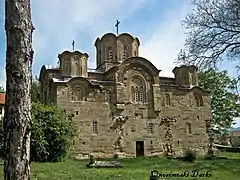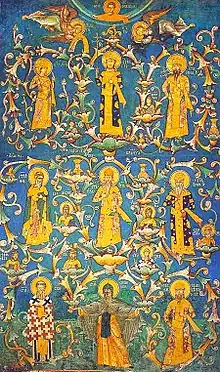Stefan Milutin
Stefan Uroš II Milutin (Serbian Cyrillic: Стефан Урош II Милутин; c. 1253 – 29 October 1321), known as Stefan Milutin (Стефан Милутин), was the King of Serbia between 1282–1321, a member of the Nemanjić dynasty. He was one of the most powerful rulers of Serbia in the Middle Ages. Milutin is credited with strongly resisting the efforts of Byzantine Emperor Michael VIII Palaiologos to impose Roman Catholicism on the Balkans after the Union of Lyons in 1274. During his regin, Serbian economic power grew rapidly, mostly due to the development of mining. He founded Novo Brdo, which became an internationally important silver mining site. As most of the Nemanjić monarchs, he was proclaimed a saint by the Serbian Orthodox Church with a feast day on October 30.[1] Milutin appears in the Dante Alighieri's narrative poem Divine Comedy.
| Stefan Milutin | |
|---|---|
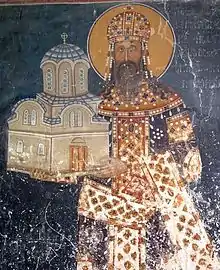 King Milutin, founder's portrait (fresco) in "King's Church" of the Studenica monastery, painted during his lifetime, around 1314 | |
| King of Serbia | |
| Reign | 1282–1321 |
| Coronation | 1282 |
| Predecessor | Stefan Dragutin |
| Successor | Stephen of Dečani |
| Born | Uroš II Milutin Nemanjić 1253 |
| Died | 29 October 1321 (aged 68) |
| Burial | St. Nedelya Cathedral in Sofia (relocated in 1460) |
| Spouse | Jelena Helena Doukaina Angelina Elizabeth of Hungary Anna Terter of Bulgaria Simonis Palaiologina |
| Issue | Stephen Constantine Stephen Uroš III Dečanski |
| House | Nemanjić dynasty |
| Father | Stefan Uroš I |
| Mother | Helen of Anjou |
| Religion | Serbian Orthodox |
Early life
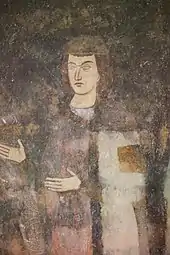
He was the youngest son of King Stefan Uroš I and his wife, Helen of Anjou. Unexpectedly he became king of Serbia after the abdication of his brother Stefan Dragutin. He was around 29. Immediately upon his accession to the throne he attacked Byzantine lands in Macedonia. In 1282, he conquered the northern parts of Macedonia including the city of Skoplje, which became his capital. Byzantine Emperor Michael VIII Palaiologos began preparations for war but he died before their completion. The next year Milutin advanced with his brother deep into Byzantine territory all the way to Kavala.
In 1284, Milutin also gained control of northern Albania and the city of Dyrrachion (Durrës). For the next 15 years there were no changes in the war. Peace was concluded in 1299 when Milutin kept the conquered lands as the dowry of Simonis, daughter of Emperor Andronikos II Palaiologos who became his fourth wife. In Nerodimlje župa Milutin had three courts, in Nerodimlje (protected by Petrič), Svrčin and Pauni.[2]
War with the Bulgarians and Mongols
At the end of the 13th century Bulgarian feudal lords Darman and Kudelin were jointly ruling the region of Braničevo (in modern Serbia) as independent or semi-independent lords. They regularly attacked Stefan Dragutin's Syrmian Kingdom, in Mačva, an area previously under the sovereignty of Elizabeth of Hungary. The Hungarian queen had sent troops to claim Braničevo in 1282–1284, but her forces had been repelled and her vassal lands plundered in retaliation.
.jpg.webp)
Another campaign, this time organized by both Dragutin and Elizabeth, failed to conquer Darman and Kudelin's domains in 1285 and suffered another counter-raid by the brothers. It was not until 1291 when a joint force of Dragutin and the Serbian King Stefan Milutin managed to defeat the brothers and, for the first time ever, the region came under the rule of a Serb, as it was annexed by Dragutin. Responding to Dragutin's annexation of Braničevo the Bulgarian prince named Shishman that came to rule the semi-independent principality of Vidin around 1280, began to attack the Serbian domains to his west.
Shishman was a vassal of Nogai Khan, Khan of the Golden Horde and sought to expand his territories to the west, invading Serbia coming as far as Hvosno, the Bulgarians failed to capture Zdrelo (near Peć) and were pursued back to Vidin by the Serbs. Milutin devastated Vidin and the rest of Shishman's dominion, making Shishman take refuge on the other side of the Danube. The two however became allies after Milutin married Serbian župan Dragoš to the daughter of Shishman, later Milutin would give his daughter Neda (with title Anna) to Shishman's son Michael who would become the Tsar of Bulgaria in 1323.
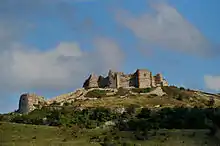
Milutin and Nogai Khan would soon come into conflict because of the war with the Tsardom of Vidin. Nogai launched a campaign against Serbia but Milutin offered peace sending his son Stefan Dečanski to Nogai's court. Stefan stayed with his entourage there until 1296 or Nogai Khan's death in 1299.
Feud of the brothers
Disputes began between Milutin and his brother Stefan Dragutin after a peace treaty with the Byzantine Empire was signed in 1299. Dragutin in the meantime held lands from Braničevo in the east to the Bosna river in the west. His capital was Belgrade. War broke out between the brothers and lasted, with sporadic cease-fires, until Dragutin's death in 1314. During this war Milutin appointed Stefan Dečanski as regent in Zeta, modern Montenegro. This meant that Stefan Dečanski was to be heir to the throne in Serbia and not Dragutin's son Stefan Vladislav II.
Battles and supreme leadership
He captured Durres in 1296.[3] On 15 March 1306 Milutin issued a charter to Ratac in which he appointed his son Stephen as his future successor.[4]
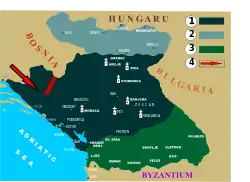
The Battle of Gallipoli (1312) was fought by Serbian troops sent by Stefan Milutin to aid Byzantine Emperor Andronikos in the defense of his lands against the Turks. After numerous attempts in subduing the Turks, the rapidly crumbling Byzantine Empire was forced to enlist the help of Serbia. The Turks were looting and pillaging the countryside and the two armies converged at the Gallipoli peninsula where the Turks were decisively defeated. Out of the gratitude to Serbia, the town of Kucovo was donated.
Upon Stefan Dragutin's death in 1314 Milutin conquered most of his lands including Belgrade and started persecute and rebaptist Catholics which led to the crusade started by Pope John XXII.[5] In 1318 there was a revolt of Albanian nobles against the rule of Stefan Milutin, which is sometimes credited to be incited by Prince Philip I of Taranto and Pope John XXII in order to weak Stefan Milutin's rule. Milutin has suppressed rebels without much difficulty.[6] In 1319 Charles I of Hungary regained control over Belgrade and banovina Mačva while Milutin held control in Braničevo. In the year 1314 Milutin's son Stefan Dečanski rebelled against his father, but was captured, blinded and sent to exile in Constantinople. For the rest of Milutin's reign his youngest son Stefan Constantine was considered as heir to the throne, but in the spring of 1321 Stefan Dečanski returned to Serbia and was pardoned by his father.
Serbia's economic power grew rapidly in the 14th century, and Milutin's power was based on new mines, mostly in Kosovo territory.[7] During his regin, Novo Brdo was the richest silver mine in the Balkans, while another important mines were Trepča and Janjevo.[7] He produced imitations of Venetian coins, which contained seven-eighths of silver compared to their coins. The were banned by the Republic of Venice, but Milutin used them to wage civil war against Dragutin.[7] Later, Novo Brdo became an internationally important silver mining site and significant strategic position, while in the 15th century, Serbia and Bosnia combined produced over 20% of European silver.[7]
Time of his reign was marked hostility to Catholicism and conversion of Catholics which provoked rebellion of Catholic nobility. Pope John XXII called Stefan Milutin as "the enemy of the Christian faith".[8]
Family
By his first wife, Jelena, a minor Serbian noblewoman, he had two children, King Stephen Uroš III[9] and Anna Neda, who married Michael Shishman of Bulgaria. By his second wife, Helena, daughter of sebastokratōr John I Doukas of Thessaly, he had no children. By his third wife, Elizabeth, daughter of King Stephen V of Hungary and Elizabeth the Cuman, Milutin had a daughter, Zorica. By his fourth wife, Anna, the daughter of George I of Bulgaria, Stefan Uroš II Milutin had a son, Stefan Konstantin. By his fifth wife Simonis, the daughter of Emperor Andronikos II Palaiologos, he had no children.
Aftermath and legacy
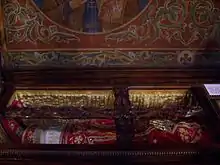
At the end of Milutin's life Serbia was second in strength in Southeast Europe after Hungary. During his reign many court ceremonials were taken over from the Byzantine court and Byzantine culture overflowed into Serbia. After his death a short civil war followed, after which the Serbian throne was ascended by his eldest son, Stefan Dečanski.
Stefan Milutin is mentioned in the Dante Alighieri's narrative poem Divine Comedy with the characteristics of counterfeiters due to the copying of Venetian money.[10][11][7] He is included in The 100 most prominent Serbs.
Foundations
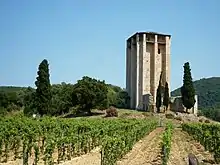
King Stefan Milutin founded a hospital in Constantinopole, which later became a medical school.[12] He also erected numerous churches and monasteries.[13] Many of them are documented in manuscripts by Danilo II, Serbian Archbishop (1324–1337).[14]
- Vitovnica Monastery near Petrovac, Serbia (1291)
- Church of St. Nicetas in Banjane, North Macedonia (ca. 1300)
- Our Lady of Ljeviš in Prizren, Kosovo[lower-alpha 1] (1306–1307)
- Church of Saint Nicetas the Goth in Banjane, North Macedonia (1307–1310)
- The King's Church of the Studenica monastery in Kraljevo, Serbia (1313–1314)
- Church of St. George in Kumanovo, North Macedonia (1313–1318)
- Banjska monastery near Zvečan, Kosovo[lower-alpha 1] (1318)
- Gračanica Monastery in Gračanica, Kosovo[lower-alpha 1] (1321)
- Church of Trojeručica near Skopje, North Macedonia (13-14th century)
- Church of Saint Constantine the Great in Skopje, North Macedonia (13-14th century)
- Bukovo monastery near Negotin, Serbia (13-14th century)
- Koroglaš monastery near Negotin, Serbia (14th century)
- Vratna monastery near Negotin, Serbia (14th century)
Reconstructions
- Monastery of Saints Sergius and Bacchus near Shirq, Albania (1293)
- Church of the Virgin Hodegetria in Mušutište, Kosovo[lower-alpha 1] (1314—1315)
- Church of Entrance of the Theotokos of the Hilandar monastery at the Mount Athos, Greece (1320)
- Church of St. Peter near Bijelo Polje, Montenegro (1320)
- Church of St. George near Skopje, North Macedonia (13-14th century)
- Monastery of St. Nicholas in Kožle, North Macedonia (13-14th century)
- Orahovica monastery near Priboj, Serbia (13-14th century)
- Treskavec Monastery near Prilep, North Macedonia (14th century)
Notes
- Kosovo is the subject of a territorial dispute between the Republic of Kosovo and the Republic of Serbia. The Republic of Kosovo unilaterally declared independence on 17 February 2008. Serbia continues to claim it as part of its own sovereign territory. The two governments began to normalise relations in 2013, as part of the 2013 Brussels Agreement. Kosovo is currently recognized as an independent state by 99 out of the 193 United Nations member states. In total, 113 UN member states recognized Kosovo at some point, of which 14 later withdrew their recognition.
References
- Ćirković 2004, p. 49-52, 61-62.
- Popović, Bogdan; Skerlić, Jovan (1932). Srpski književni glasnik. p. 388. Retrieved 20 December 2013.
... Милутннови Неро- димл.а, Петрч и Пауни...
- "[Projekat Rastko - Skadar] Stanovnistvo slovenskog porijekla u Albaniji". Retrieved 12 September 2014.
- Zbornik radova Vizantoloshkog instituta. Institut. 2009. p. 338.
- Ivica Puljić 2015, Sedam stoljeća otoka Mrkana u naslovu trebinjskih biskupa {Milutin je nakon smrti kralja Dragutina 1316. godine zaposjeo njegove krajeve i bacio mu sina nasljednika Vladislava u tamnicu. Kako je počeo progoniti i prekrštavati katolike, papa je pokrenuo križarski rat protiv "nevjernoga raškog kralja", "After the death of King Dragutin in 1316, he took over his lands and threw his son Vladislav to prison(dungeon). As he began to persecute and rebaptist Catholics, the pope launched a crusade against the "unfaithful King of Rascia" https://hrcak.srce.hr/153752 #page= 95-96
- Fine, John V. A.; Fine, John Van Antwerp (1994). The Late Medieval Balkans: A Critical Survey from the Late Twelfth Century to the Ottoman Conquest. University of Michigan Press. p. 262. ISBN 978-0-472-08260-5. Retrieved 9 April 2020.
- Vukovic & Weinstein 2002.
- Dijana Pinjuh, VJERSKE PRILIKE KOD KATOLIKA U HERCEGOVINI (OD TURSKOG OSVAJANJA DO KONCA 17. STOLJEĆA), 2013 Doctoral Dissertation, #page=14-15
- Nicol 1984, p. 254.
- Gallagher 1999, p. 172.
- Holton & Mihailovich 1988, p. 16.
- Ćorović, Vladimir. Istorija srpskog naroda I. p. 335.
- Todić 1999.
- Janić, Dragana (2014). "Crkvena imovina i ktitorska delatnost srpskih vladara do druge polovine XIV veka". Church Studies. 1: 333–344.
Sources
- Bataković, Dušan T., ed. (2005). Histoire du peuple serbe [History of the Serbian People] (in French). Lausanne: L’Age d’Homme. ISBN 9782825119587.
- Ćirković, Sima (2004). The Serbs. Malden: Blackwell Publishing. ISBN 9781405142915.
- Ćurčić, Slobodan (1979). Gračanica: King Milutin's Church and Its Place in Late Byzantine Architecture. Pennsylvania State University Press. ISBN 9780271002187.
- Engel, Pál (2001). The Realm of St. Stephen: A History of Medieval Hungary, 895-1526. London & New York: I.B.Tauris. ISBN 9781850439776.
- Fine, John Van Antwerp Jr. (1994) [1987]. The Late Medieval Balkans: A Critical Survey from the Late Twelfth Century to the Ottoman Conquest. Ann Arbor, Michigan: University of Michigan Press. ISBN 0472082604.
- Gallagher, Joseph (1999). A Modern Reader's Guide to Dante's The Divine Comedy. Liguori/Triumph. ISBN 9780764804946.
- Holton, Milne; Mihailovich, Vasa D. (1988). Serbian Poetry from the Beginnings to the Present. MacMillan Center for International and Area Studies.
- Isailović, Neven (2016). "Living by the Border: South Slavic Marcher Lords in the Late Medieval Balkans (13th-15th Centuries)". Banatica. 26 (2): 105–117.
- Ivanović, Miloš (2019). "Serbian hagiographies on the warfare and political struggles of the Nemanjić dynasty (from the twelfth to the fourteenth century)". Reform and Renewal in Medieval East and Central Europe: Politics, Law and Society. Cluj-Napoca: Romanian Academy, Center for Transylvanian Studies. pp. 103–129.
- Jireček, Constantin (1911). Geschichte der Serben. 1. Gotha: Perthes.
- Krstić, Aleksandar R. (2016). "The Rival and the Vassal of Charles Robert of Anjou: King Vladislav II Nemanjić". Banatica. 26 (2): 33–51.
- Mošin, V. (1971) Povelje kralja Milutina - diplomatička analiza. Istorijski časopis, XVIII
- Nicol, Donald M. (1993) [1972]. The Last Centuries of Byzantium, 1261-1453. Cambridge: Cambridge University Press. ISBN 9780521439916.
- Nicol, Donald M. (1984). The Despotate of Epiros 1267-1479: A Contribution to the History of Greece. Cambridge University Press.
- Ostrogorsky, George (1956). History of the Byzantine State. Oxford: Basil Blackwell.
- Sedlar, Jean W. (1994). East Central Europe in the Middle Ages, 1000-1500. Seattle: University of Washington Press. ISBN 9780295800646.
- Todić, Branislav (1999). Serbian Medieval Painting: The Age of King Milutin. Belgrade: Draganić. ISBN 9788644102717.
- Uzelac, Aleksandar B. (2011). "Tatars and Serbs at the end of the Thirteenth Century". Revista de istorie Militara. 5–6: 9–20.
- Uzelac, Aleksandar B. (2015). "Foreign Soldiers in the Nemanjić State - A Critical Overview". Belgrade Historical Review. 6: 69–89.
- Vukovic, Milovan; Weinstein, Ari (2002). "Kosovo mining, metallurgy, and politics: Eight centuries of perspective". Journal of Minerals, Metals and Materials Society Volume. 54 (5): 21–24. Bibcode:2002JOM....54e..21V. doi:10.1007/BF02701690. S2CID 137591214.
| Wikimedia Commons has media related to Stefan Uroš II Milutin of Serbia. |
Stefan Milutin Born: 1253 Died: 29 October 1321 | ||
| Regnal titles | ||
|---|---|---|
| Preceded by Stefan Dragutin |
King of Serbia 1282–1321 |
Succeeded by Stefan Uroš III Dečanski |
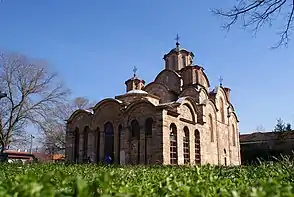
.jpg.webp)
